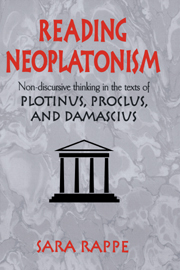Book contents
- Frontmatter
- Contents
- Preface: Discursive Strategies and Neoplatonic Texts
- Acknowledgments
- List of Abbreviations
- 1 Introduction. Representing a Tradition: Exegesis, Symbol, and Self-reflection
- PART I LANGUAGE IN THE ENNEADS
- PART TWO TEXT AND TRADITION IN NEOPLATONISM
- References
- General Index
- Index Locorum
Preface: Discursive Strategies and Neoplatonic Texts
Published online by Cambridge University Press: 24 October 2009
- Frontmatter
- Contents
- Preface: Discursive Strategies and Neoplatonic Texts
- Acknowledgments
- List of Abbreviations
- 1 Introduction. Representing a Tradition: Exegesis, Symbol, and Self-reflection
- PART I LANGUAGE IN THE ENNEADS
- PART TWO TEXT AND TRADITION IN NEOPLATONISM
- References
- General Index
- Index Locorum
Summary
In Reading Neoplatonism I discuss the history and nature of Neoplatonic textuality. Over many centuries, Neoplatonism, based now in Alexandria, now in Athens, associated itself with a fixed textual tradition – the corpus of Plato's dialogues and the exegetical tradition associated with it – despite or perhaps even because of this temporal and geographic breadth. And yet more than the adherants of any other ancient philosophical lineage the Neoplatonists insisted that wisdom could be located only outside all texts and outside all language.
Why were the Neoplatonists, who explored so intensively non-discursive or non-propositional thinking, and who subjected formal dialectic to such criticism, exegetical beyond all other schools of ancient philosophy? And how does their suspicion of discursive thinking manifest itself in their texts? Working with the texts of Plotinus, Proclus, Damascius, and others, I show how lack of confidence in discursive argument shaped the textual strategies available to these authors. These texts often appropriate elements from ritual, repeatedly investigate the limits of discursive thinking, and try to illustrate how non-discursive thinking is supposed to work. We find texts that are at odds with their own textuality, discourses that deny that anything has been asserted, and discursive strategies that set themselves against their very discursivity. What are the issues that shaped the very distinctive textual practices reflected in the Neoplatonic tradition?
- Type
- Chapter
- Information
- Reading NeoplatonismNon-discursive Thinking in the Texts of Plotinus, Proclus, and Damascius, pp. ix - xviiiPublisher: Cambridge University PressPrint publication year: 2000



